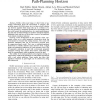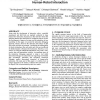1155 search results - page 194 / 231 » Toward Social Robotics |
IROS
2007
IEEE
14 years 2 months ago
2007
IEEE
— Any system that has the capability to diagnose and recover from faults is considered to be a fault-tolerant system. Additionally, the quality of the incorporated fault-toleranc...
IROS
2006
IEEE
14 years 1 months ago
2006
IEEE
Abstract— Mobile robots need maps or other forms of geometric information about the environment to navigate. The mobility sensors (LADAR, stereo, etc.) on these robotic vehicles ...
HRI
2006
ACM
14 years 1 months ago
2006
ACM
Along with the development of interactive robots, controlled experiments and field trials are regularly conducted to stage human-robot interaction. Experience in this field has sh...
HRI
2006
ACM
14 years 1 months ago
2006
ACM
We present a method of grounded word learning that is powerful enough to learn the meanings of first and second person pronouns. The model uses the understood words in an utteran...
IROS
2009
IEEE
14 years 2 months ago
2009
IEEE
Abstract— Previous work [1] shows that the movement representation in task spaces offers many advantages for learning object-related and goal-directed movement tasks through imit...


